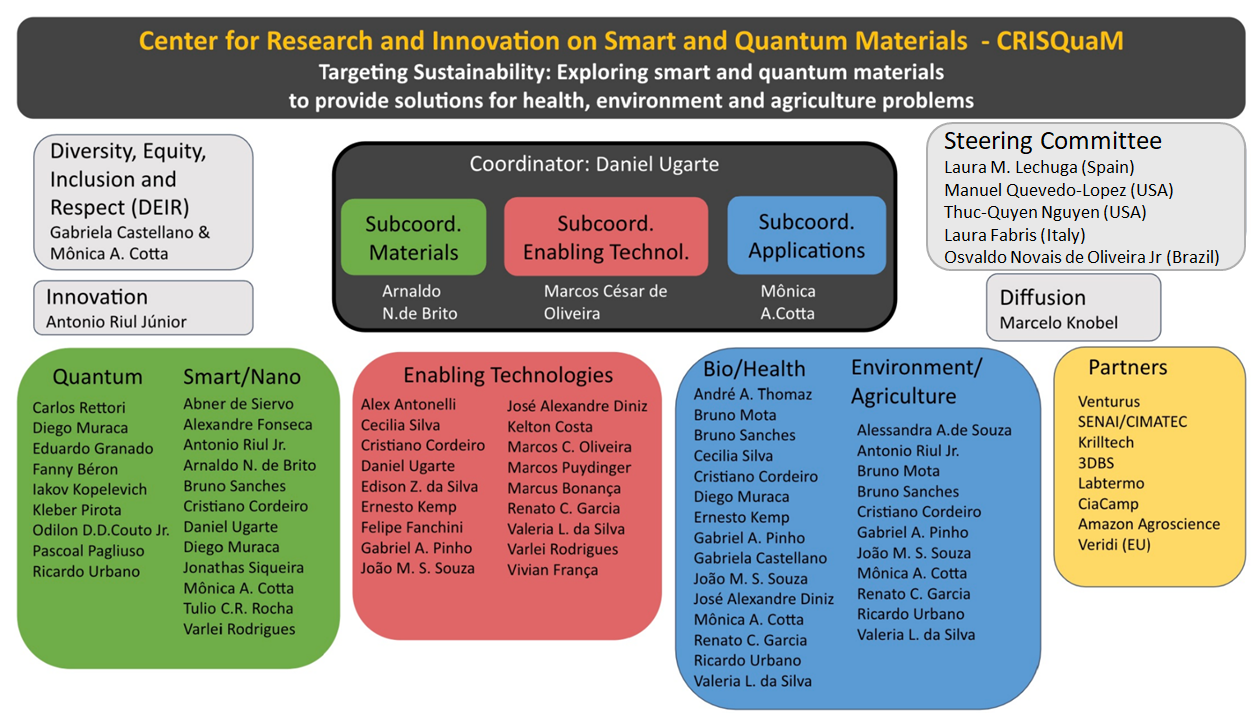BV-FAPESP: research projects supported in this Center
CRISQuaM in the Media: news about the center
CRISQuaM aims to explore the synergistic development of fundamental and applied science to create new materials with high potential for the construction of devices and sensors to address technological challenges related to sustainability, climate change, precision agriculture, ecology, and health. To achieve these goals, we have assembled an interdisciplinary and collaborative research team, integrating expertise across various scientific domains, researching novel materials with high innovation potential. By combining original synthesis methods, advanced characterization techniques, theoretical approaches, computational simulations, quantum technologies, and device construction designs, we aim to drive advances in smart and quantum materials, promoting scientific excellence and technological development. With this, we plan disruptive innovations in instrumentation—including hardware and AI-based tools—as well as in quantum technologies, biomedical devices, and signal processing, in addition to plant bionics, exploring plant-pathogen interactions. Besides research activities, we plan intensive actions in education, dissemination, and communication for the general public, as a modern society should be aware of the challenges humanity faces and how research and technology are essential for responsibly utilizing the planet's limited resources. CRISQuaM's Innovation activities are accelerated through partnerships with several companies in related technologies, many of them Brazilian. Finally, all activities of the Center are managed in accordance with diversity, equity, and inclusion goals and best practices.
The Center brings together scientists, engineers, and innovators in a collaborative effort to apply materials science and quantum technologies at the cutting edge, designing new materials and nano(bio)sensors for advanced diagnostics. The Center has a team capable of producing a wide range of (nano/micro) materials, along with precise chemical and physical characterizations using modern techniques (synchrotron, advanced microscopy, magnetotransport, magnetic resonance, optics, etc.). In addition, the team offers various options in enabling technologies, including miniaturization, processing, and additive manufacturing, as well as instrumentation, quantum sensing, and electronics development. Data analysis will employ updated approaches (numerical simulation, classical and quantum machine learning, and quantum optimization). Applications at the knowledge frontier will address urgent sustainability needs in environmental areas, precision agriculture, plant bionics, and biomedical interfaces, contributing to the development of local technologies in close partnership with the Brazilian industry.
The organization of the Center is based on three pillars — Materials, Enabling Technologies, and Applications — together with partner companies, as described in the figure below.

2025-06-20
The assessment was made by Barbara Pompili, the French Ambassador for the Environment, at the opening of a forum at the National Museum of Natural History in Paris. The event is part of the FAPESP Week France program.
2025-06-20
In partnership with FAPESP, the National Museum of Natural History of France is holding a seminar for scientists, museologists, and representatives of indigenous communities to discuss new visions and missions for these institutions.
2025-06-20
At a symposium in Paris, a University of São Paulo professor of zoology explains how new technologies allow for the use of degraded DNA from specimens preserved for decades, contributing to the advancement of scientific knowledge and the conservation of biodiversity.
2025-06-20
The goal of reintroducing the bird is to restore the original fauna of the forest and its functionality. Supported by FAPESP, the project was presented at the Brazil-France Forum on Forests, Biodiversity, and Human Societies in Paris.
2025-06-18
Scientists from the Curie Institute and the University of São Paulo are about to conduct a clinical study to evaluate the safety and efficacy of a new CAR-T cell-based immunotherapy for patients with oculocerebral lymphoma; the project was presented at FAPESP Week in Toulouse.
2025-06-18
University of São Paulo researchers are developing an aircraft equipped with sensors that can detect and measure the concentrations of carbon dioxide and methane in the environment; the project was presented at FAPESP Week France in Toulouse.